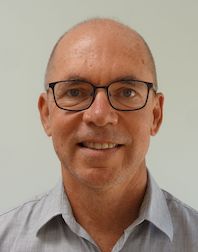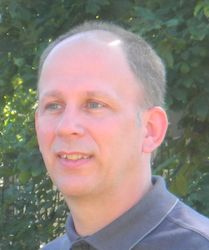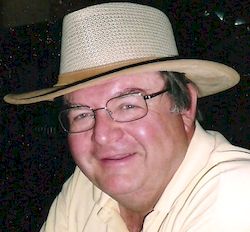BDR Collaborators
Colin Blakebrough
Colin's favorite early recollection of stamp collecting was of his father buying him a
penny black for his collection at the Festival of Britain in 1951 some 73 years ago. Since
his early collecting days, he has explored different avenues of stamp collecting. In 1978
he decided to give up collecting U.S. postage stamps because they were starting to be
produced in vast numbers that felt like wallpaper to him. He then decided to collect the odd
little stamps referred to as "precancels," and among these he took special notice of the
battleship issues with commercially made overprint cancellations. Over the years he had amassed
some 2,700 of these printed types when a chance mention to one of his U.S. correspondents that
he was looking to purchase these 'battleships' resulted in an offer of the Joyce 'reference'
collection of some 26,500 examples, as the then owner had purchased the collection with a
view to combining it with his own but had neither the time or inclination to do so. Colin
then spent over 3 years integrating his own stamps into the Joyce collection and remounting
the entire collection so that each stamp was labeled with a typed description. He still collects
the battleships but finding new additions has become more challenging now that his collection
contains over 29,000 mainly printed cancellations. He has been a collector all his life, and
while his interests have waxed and waned with various collections, he has always loved his
"battleships" and expects to continue this love for years to come.
Malcolm Goldstein
Malcolm A. Goldstein has possessed an abiding interest in stamps for as long as he can
remember and aspired to be a serious philatelist until making a living and raising a family
directly interfered. After renouncing stamp-collecting entirely and disposing of his holdings, he
was inexorably drawn back to it when his nest was again empty, but tried to hone his interest to a
narrow and manageable area of specialization. Battleship proprietaries seemed to fit that bill
from a philatelic standpoint, but his cross-disciplinary approach of studying the patent medicine
industry itself by mixing stamps, covers, the always more flamboyant tradecards and examples
of the products themselves, never appealed to pure philatelists and has made him wary of
philatelic societies. While an attorney by profession, he traces his interest in patent medicines
back to the diathermy machine displayed in the office of his father, an old-fashioned “general
practitioner,” which was in the basement of the family house. He was greatly relieved when
assured some years ago, upon inquiry at the Museum of Questionable Medical Devices - then
extant on its own and now apparently part of the Museum of Science in Minneapolis, MN - that
the diathermy machine was a scientifically valid treatment utilizing heat to kill infections of the
blood in the years before antibiotics.
Timothy Kohler
Tim Kohler is a 25 year plus member of the APS and ARA. He was introduced to stamp collecting
at a young age when his mother gave him numerous covers she had received over the years franked with
air mail stamps. After a brief hiatus for college, he rediscovered his interests in stamp collecting.
However, being a graduate student, air mail stamps were beyond his means. Digging deeper into the
back-of-the-book he found the battleship revenue stamps. While building his collection and knowledge
of these stamps, he was introduced to Frank Sente and, later, Bob Mustacich. He later expanded his
collecting to include the Documentary Revenue Issues of the Civil War. Over the years he was able to
build gold medal winning exhibits with both the Documentary and Proprietary stamps of the Spanish American
War as well as the Documentary Revenue Issues of the Civil War.
Professionally, Tim earned a PhD from Penn State in petroleum and natural gas engineering. Realizing
that his interests were broader than just petroleum, he made a career switch to take a position as a
research engineer with a Navy affiliated laboratory at Penn State. He currently leads a Sensor Technologies
group at the Applied Research Lab which focuses on providing next generation systems to the Government.
When stamps are not consuming his spare time, he supports various Scout programs as well operating a small
fireworks company.
 Robert Mustacich
Robert Mustacich
Robert Mustacich is a member of the ARA, APS, the Institute for Analytical Philately, and the
France and Colonies Philatelic Society. He is the president of the Collector's Club of Southern
California for 2023-2024, and has won gold medal awards for his exhibits in revenue stamps, analytical
philately, and postal history. Bob was lead author of the original Battleship Desk Reference that
was published in 1999 with co-author Anthony (Tony) Giacomelli. Tony owned the massive collection of
hand stamped cancellations that was put together by Joyce. Bob later acquired this battleship cancel
collection from Tony and combined it with his own. He led and organized the collaboration and
creation of the present online BDR project.
Bob was trained as a physical chemist receiving his Ph.D. from Harvard University. He pursued a
career in biochemistry, engineering, physics, and analytical chemistry instrumentation. He was an
inventor and developer of commercial devices for low power, portable analytical chemistry instruments.
He is the author of numerous publications, scientific and philatelic.
He was introduced to stamp collecting by his father who had a career with the U.S. Postal Service,
working his way from a letter carrier to assistant postmaster. It was much later in some of his work
involving pharmaceutical device physics that he learned about proprietary medicine tax stamps of the
19th century, and this rekindled his interest in stamp collecting in the 1980s. Always on the watch
for fertile backwaters for research, he found the cancels on the 1898 proprietary stamps to offer a
fascinating and vast area of opportunity for collecting.
In his spare time, Bob is a pianist and arranger of classical piano pieces for the piano. He also
takes advantage of the Southern California climate and is a gardener of rare succulents. He is a past
Vice President of the Santa Barbara Cactus and Succulent Society.
 Paul Reese
Paul Reese
Paul Reese, a life member of the APS since 1997 and a more recent member of the ARA, acquired his general philatelic
interest as a child helping his parents with their world-wide collection. Paul has fond memories of sorting and
identifying stamps by country and helping his parents mount stamps into their albums. Some specific memories include
working through a group of British Colony issues from Australia and South Africa. As a young adult, he narrowed the
scope of his collecting interests to US issues; regular, commemorative, and air-mail; focusing on unused singles.
Paul continued this pursuit for 30-years.
Paul is now a retired Software Engineer and Manager. His career spanned different industries. His first role was
in the telecommunications industry where he designed and built a platform to enable operator assisted long-distance
telephone calls from hotels and payphones (yes, pre-cellphone ubiquity). As that industry began to constrict, Paul chose
to make a change. His next role was in the financial industry, leading a team enabling credit-based products on the
PayPal platform. After achieving multiple successes in that role, Paul changed industries again. His last change was to
a government contracting company supporting systems that perform automated diagnostic testing of military components.
Approaching retirement, Paul shifted his philatelic focus, selling his US collection and focusing his collecting
interest to the 1898 Proprietary Battleship issues with printed and hand stamped cancels. At the start of the Covid
pandemic, Paul was approached by Bob to contribute to the BDR project.
 Frank Sente
Frank Sente
Frank spent most of his career working for the American Philatelic Society(APS) and the American Philatelic Research
Library(APRL). While still a student at Penn State he started working part time at the APS helping manage the routing of
stamp sales circuits and in the APRL. Although he had contemplated pursuing a law degree after graduating from Penn State,
when offered fulltime employment at APS/APRL he chose this instead. While one who works for any non-profit doesn’t make
scads of money, he never regretted his decision. It provided him the opportunity to work in a philatelic environment and
allowed him the opportunity to meet and befriend a multitude of truly interesting people.
An early mentor impressed upon him that one has an obligation to give back to the communities in which they live and
work, so Frank has belonged to various civic organizations and served a number of local non-profit boards both in State
College, PA, where he lived for 30 years, and in Prescott, AZ, where he has lived for the last 20 years. Philatelically,
he has served as an officer in the Mt. Nittany Philatelic Society and the Prescott Stamp Club, and spent 8 years as the
Exhibit Chairman/Jury Coordinator for ARIPEX. He has cut back, and now only serves on the board of the American Revenue
Association.
Frank has always been more interested in the use of stamps and cancels than in the stamps themselves. In addition to
the cancels used on the 1898 US battleship revenues, he has also collected Iceland numeral cancels, Spanish numeral cancels,
and the squared circle cancels of Canada. His exhibit, "Spanish American War Fiscal History: The US Documentary Taxes of
1898-1902," has won several ARA grand awards, and two WSP grand awards: MN STAMP EXPO 2014 and PIPEX 2019.
Acknowledgements
Special thanks to Joe Odziana who provided scans of his collection of hand stamped proprietary battleships to us,
and to Duane Skeen who assisted the BDR team with various matters.